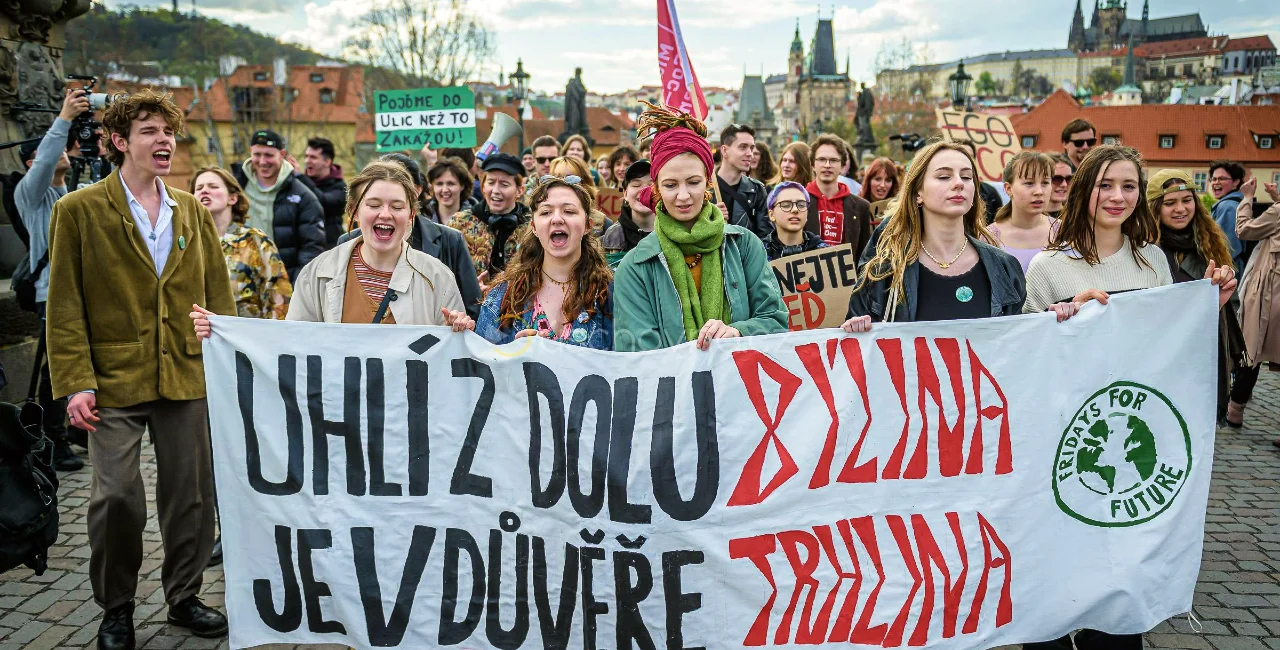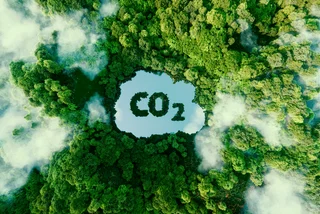Over 100 young people took to the streets of Prague on Friday, April 21, to protest against the extension of mining at the Bílina coal mine in the north of the country until 2035. Coal is a hot topic in the country, and the demonstration is indicative of the long-standing and complicated relationship Czechia has with the heat source.
Members of the Czech division of the international Fridays for Future (FFF) movement, who were behind the demonstration, claim that the extension will lead to the destruction of Czechia’s landscape and the worsening of the climate crisis.
Breaking promises?
The protest was a response to the decision of the District Mining Office in Most, Ústí nad Labem, to allow operations at the region's Bílina mine to continue until 2035. This goes against the government’s program statement to cease coal mining by 2033.
Czech FFF members Eva Simandlová and Ema Rychecká“Already in 2017, the We Are The Limits (Limity jsme my) movement protested against coal mining at Bílina. At that time, it was about extending mining until 2050. Now here we are again, six years later, protesting again"
The company managing the Bílina mine is controlled by ČEZ Group, in which the state has an almost 70 percent share. FFF, therefore, wrote a letter to Prime Minister Petr Fiala, citing his previous pledges to create the right conditions for Czechia’s energy transformation to instigate a shift away from coal.
DÄšKUJEME vÅ¡em, kteřà dorazili na dneÅ¡nà stávku za klima!â¤ï¸â€ðŸ”¥ Dali jsme pořádnÄ› najevo, že s prodlouženÃm těžby na dole BÃlina zásadnÄ› nesouhlasÃmeâ—ï¸
— Fridays for Future ÄŒeská republika (@F4FutureCZ) April 21, 2023
Tyto akce nás stojà penÃze. Pokud máte tu možnost, pÅ™ispÄ›jte nám prosÃm na https://t.co/yz2yn7P5EM
Moc si vážÃme vaÅ¡Ã podpory!✨ pic.twitter.com/ilj27evDcd
The government has defended itself, however, by saying that continuing operations at Bílina does not conflict with its prior goals.
Co-ordinator of the Greenpeace Czechia energy campaign, Jaroslav Bican"According to the Ministry of Industry, the extension of mining at Bílina does not conflict with the government's plan to move away from coal by 2033. This plan is allegedly aimed only at stopping the burning of coal, for example in the production of electricity, and doesn't apply to mining that may lead to the sale of coal on the market"

Problems across the border
The Bílina mine is not the only aspect that FFF is aggrieved about. The movement also demands governmental transparency about Poland’s Turów coal mine, which is just kilometers from Czechia’s border and affects the latter’s environment.
FFF and other climate-activist groups want Fiala’s government to publish a report that details the damaging effects Turów has on Czech groundwater. Protesters say that the Polish mine contributes to serious water loss in Czechia.
COAL'S EFFECTS ON CZECHIA
- Coal-fired power plants generate almost over 40 percent of total Czech electricity output
- Demand for brown coal – the cheapest and most energy-inefficient form of the material – used by Czech households jumped by almost 35 percent in the first nine months of 2022 year on year
- Czechia reduced its production of hard coal from 11.9 million tons in 2010 to 2.2 million tons in 2021
- A 2022 study by the European Environment Agency found that Prague was ranked a lowly 251st out of 375 countries for its air quality
- In 2019, about 13,500 people were employed in the Czech coal-mining sector
- Czechia has the third-highest amount of coal reserves out of the whole EU
- The country is ranked 17th out of all EU/EEA countries in the 2022 Environmental Performance Index
- A 2021 study of more than 800 European cities by the Barcelona Institute for Global Health placed the regional capital of Ostrava and the nearby towns of Karviná and Havířov among the top 10 most polluted European cities
- The country’s proven coal reserves have been estimated to total 705 million tons
- The state of Czechia’s environment is among the worst in the EU (where it ranks 22nd out of 27 EU countries) and contributes to 3,200 deaths annually in the country according to the 2023 Prosperity Index
- Sources: Associated Press, European Commission, Environmental Performance Index, BP, ISGlobal, European Environmental Agency, Euracoal
“At the very beginning of [the government’s] term, we saw a non-transparently signed agreement on the Turów mine, where mining is now planned till 2044,” ČTK reports the protest organizers as saying.
In the letter to Fiala, FFF referred to the Intergovernmental Panel on Climate Change report, which states that Czechia has approximately 10 years to drastically change its approach to solving the climate crisis, preferably by switching to renewable energy sources.
Discontent is growing. More demonstrations, organized by the Universities for Climate (Univerzity za klima) organization, are going on this week in Prague in protest of the government's current policies.
A dependency on coal?
Czechia’s reliance on coal is well-documented. As per a Eurostat report released last month, Czechia is one of just two countries in the EU that continue to produce hard coal (anthracite, which contains the highest amount of carbon), the other being Poland.
The EURACOAL coal map for 2022 is out! Download it at https://t.co/J8rgxxpzdG pic.twitter.com/kL3VQUJSZo
— EURACOAL (@EURACOAL) April 20, 2023
In 2021, Czechia produced 2.2 million tons of hard coal, comprising 4 percent of total EU production.
Czechia also has the third-highest consumption of brown (lignite) coal out of all EU countries, comprising over 10 percent of total use in the bloc at about 30 million tons per year.
Recent decades, however, have seen Czechia do well in its broad aims of reducing coal usage. In 1993, Czechia produced over 80 million tons of coal in total – a figure that is now at about 35 million tons. The International Energy Agency also notes that the domestic production of coal in Czechia has decreased by about 36 percent since 2009.
Still not fully turning away
However, the widescale outbreak of the Russia-Ukraine war has seen the government alter its stance with regards to energy production.
In June 2022, Minister of Finance Zbyněk Stanjura announced that Czechia reversed its original plans to halt mining in an Ostrava coal mine, citing the need for Czechia to “safeguard its power supply amid high demand,” as reported by the Associated Press.

As part of the EU’s aims to phase out coal usage, it is offering coal-manufacturing regions in the bloc millions of euros to assist them with projects designed to move away from coal. Certain areas in Czechia, however, may miss out on up to “tens of billions of crowns,” due to inconcrete moves to phase out coal production as written in Hospodářské noviny.
As specified by a European Parliament briefing entitled “Climate action in Czechia,” the country produces 3.5 percent of the EU's total greenhouse gas emissions – substantially higher than the EU average.
A large problem currently, according to FFF, is that much of Czechia’s economy is based on coal and nuclear energy – more so than other European countries.
A lot of work ahead for Czechia
The government is aware of Czechia’s current environmental struggles. In its State Environmental Policy for 2030-50, Czechia aims to improve air quality, decrease greenhouse-gas emissions, and boost diversity. It must also follow the EU’s directives as part of the multinational Green Deal.
However, there is much still to do. A 2023 report compiled by several environmental NGOs found that Czcechia is “only partially fulfilling” its environmental pledges – with one of its shortcomings being its conversion of coal-produced energy to nuclear or renewable energy.
Prime Minister Petr Fiala speaking at the COP27 climate conference in Egypt in late 2022“The Czech Republic fully adheres to the common climate goals of the EU – to reduce greenhouse gas emissions by at least 55 percent by 2030 and to achieve climate neutrality by 2050”
Czechia’s 2021 Environmental Report concluded by Czech Environmental Information Agency also detailed substantial shortcomings – namely, excessive coal burning in Czech households and an above-average amount of produced emissions.
The government’s struggles with coal are clear. Although it is a cheaper method of sourcing energy (especially in the context of the current war in Ukraine) with ample resources available, coal’s environmentally damaging effects can not be understated.
With Czechia producing the seventh-highest amount of greenhouse gas emissions of out all EU countries in 2021 (and the second-most carbon dioxide emissions per capita in 2019, according to World Bank data), the government has a tough call to make if it wants to phase out coal in the next decade. FFF’s protest is a sign that people’s patience – and the time left to change Czechia’s environmental direction – may well be running out.












 Reading time: 6 minutes
Reading time: 6 minutes 

































